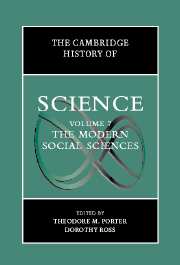Book contents
- Frontmatter
- 1 Introduction: Writing the History of Social Science
- PART I SCIENCES OF THE SOCIAL TO THE LATE NINETEENTH CENTURY
- 2 Genres and Objects of Social Inquiry, From the Enlightenment to 1890
- 3 Social Thought and Natural Science
- 4 Cause, Teleology, and Method
- 5 Utopian Socialism And Social Science
- 6 Social Surveys in the Eighteenth and Nineteenth Centuries
- 7 Scientific Ethnography and Travel, 1750–1850
- 8 History and Historicism
- 9 Bringing the Psyche into Scientific Focus
- 10 Continental Political Economy From the Physiocrats to the Marginal Revolution
- 11 British Economic Theory From Locke To Marshall
- 12 Marx and Marxism
- PART II THE DISCIPLINES IN WESTERN EUROPE AND NORTH AMERICA SINCE ABOUT 1880
- PART III THE INTERNATIONALIZATION OF THE SOCIAL SCIENCES
- PART IV SOCIAL SCIENCE AS DISCOURSE AND PRACTICE IN PUBLIC AND PRIVATE LIFE
- Index
- References
4 - Cause, Teleology, and Method
from PART I - SCIENCES OF THE SOCIAL TO THE LATE NINETEENTH CENTURY
Published online by Cambridge University Press: 28 March 2008
- Frontmatter
- 1 Introduction: Writing the History of Social Science
- PART I SCIENCES OF THE SOCIAL TO THE LATE NINETEENTH CENTURY
- 2 Genres and Objects of Social Inquiry, From the Enlightenment to 1890
- 3 Social Thought and Natural Science
- 4 Cause, Teleology, and Method
- 5 Utopian Socialism And Social Science
- 6 Social Surveys in the Eighteenth and Nineteenth Centuries
- 7 Scientific Ethnography and Travel, 1750–1850
- 8 History and Historicism
- 9 Bringing the Psyche into Scientific Focus
- 10 Continental Political Economy From the Physiocrats to the Marginal Revolution
- 11 British Economic Theory From Locke To Marshall
- 12 Marx and Marxism
- PART II THE DISCIPLINES IN WESTERN EUROPE AND NORTH AMERICA SINCE ABOUT 1880
- PART III THE INTERNATIONALIZATION OF THE SOCIAL SCIENCES
- PART IV SOCIAL SCIENCE AS DISCOURSE AND PRACTICE IN PUBLIC AND PRIVATE LIFE
- Index
- References
Summary
The model of social science established in methodological writings of the 1830s and 1840s formed an ideal that has endured to the beginning of the twenty-first century. Subsequent authors have been obliged to excuse the social sciences for their failure to achieve this ideal model of science, to reinterpret the successes of social science in terms of it, or to construct alternative conceptions of social science in contrast to it. The ideal was worked out in two closely related texts, Auguste Comte’s (1798–1857) Cours de Philosophie Positive and John Stuart Mill’s (1806–1873) A System of Logic. The positive achievement of these texts was to clarify the application of the notion of “law” to the subject matter of social science. Their negative achievement was to eliminate, as much as possible, the role of teleological thinking (explanation appealing to purposes or “final causes”) from the study of the social realm.
The subject of this chapter will be the reformulation of the ideas of cause and teleology before and during the period of Mill and Comte, and its aftermath up to the early twentieth century in the thinking of several founding figures of disciplinary social science. The discussion to be examined here focused on the problem of the sufficiency of causal explanations, and particularly on the question of whether some particular fact could be explained without appeal to purpose. In response to such questions, the defenders of the new conception attempted to replace older terms with new ones, replacing “purpose” with “function,” for example.
Information
- Type
- Chapter
- Information
- The Cambridge History of Science , pp. 57 - 70Publisher: Cambridge University PressPrint publication year: 2003
References
Accessibility standard: Unknown
Why this information is here
This section outlines the accessibility features of this content - including support for screen readers, full keyboard navigation and high-contrast display options. This may not be relevant for you.Accessibility Information
- 2
- Cited by
